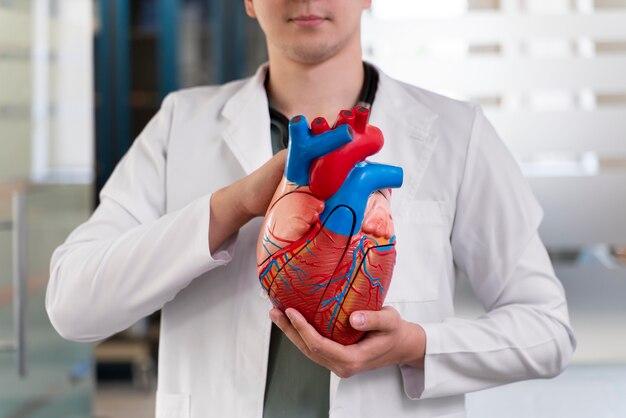Last updated on April 19th, 2025 at 02:18 pm

Heart tests: the progress
The first electrocardiogram from the intact human heart was recorded with a mercury capillary electrometer in 1887 in London. Since then, the techniques and blood tests for the detection of heart disease have improved by leaps and bounds. Heart screenings, check-ups, and tests have saved millions of lives worldwide.
Blood tests for heart attack can tell you whether you have heart disease or are at risk for developing it. Blood tests for heart function and heart attack detect substances that should not be present or measure the levels of such substances to ensure they are at optimal concentrations.
What is heart disease and why is a blood test for heart attack important?

Heart disease or coronary heart disease occurs when plaque builds up in arteries and prevents oxygen from reaching the heart. Without blood, tissues lose oxygen and die. Blood tests for heart attack, heart disease, heart function, or cardiac profile can tell if you are at risk for heart disease. That way, you can take steps in prevention.
Risk factors for heart disease
There are several risk factors for heart disease — obesity, family history of heart disease, inactive lifestyle, smoking, unhealthy food habits, high cholesterol, blood pressure, and clinical depression. Keep in mind that most of these are lifestyle-related and preventable. If you believe you are at risk, get a blood test for a heart attack and put your mind at ease.
Why are heart health check-ups and screening important?
Whether you are at risk for heart disease or not, regular heart screenings and check-ups can help prevent or lower the risk of cardiovascular disease. Get a blood test for heart attack or blood test for heart function regularly.
What are four heart-related blood tests?
• Cholesterol test: It is also known as a lipid panel or lipid profile test. This blood test for heart disease measures fat levels in the blood. Here are some of the evaluations from this blood test for heart attack.
Total cholesterol: a high level can increase the risk of heart disease. The total cholesterol level should be below 200 milligrams per deciliter (mg/dL) or 5.2 millimoles per litre (mmol/L).
Low-density lipoprotein (LDL) cholesterol: high values could indicate a plaque build-up in the arteries. LDL cholesterol should be less than 130 mg/dL (3.4 mmol/L) and under 100 mg/dL (2.6 mmol/L) if you have diabetes or a history of a heart attack. In those with the highest risk of heart attacks, LDL levels should be below 70 mg/dL (1.8 mmol/L).
High-density lipoprotein (HDL) cholesterol needs to be over 40 mg/dL or 1.0 mmol/L in men and over 50 mg/dL or 1.3 mmol/L in women. This component is good for the body as it helps keep arteries open and blood flowing freely.
Triglycerides are fat molecules present in the blood. Their high levels indicate a greater risk of heart disease. Their levels should be less than 150 mg/dL or 1.7 mmol/L.
• C-reactive protein test: C-reactive protein is produced by the liver as a part of the body’s response to injury or infection. If it exceeds 2.0 milligrams per litre, it indicates a higher risk of heart disease
• Lipoprotein (a): This component is more genetic and is not related to or affected by lifestyle. But high levels of Lp(a) may indicate that you are at increased risk of heart disease. Your doctor may want this blood test for heart attack done in case you have atherosclerosis, heart disease, or a family history of stroke.
• Plasma ceramides: This blood test for heart attack measures the levels of ceramides in the blood, which are synthesized by all cells for tissue growth. Certain ceramides point to plaque buildup in the arteries and insulin resistance. High levels of these ceramides are a red flag for a higher risk of cardiovascular disease.
Conclusion
Around 17.9 million lives are lost every year globally to heart disease. This brings to the fore the importance of blood tests for heart attacks. Regular check-ups, tests, and screening can go a long way in preventing heart disease by setting you on the right path to keeping this vital organ healthy. Also, maintain a healthy lifestyle with a good diet and regular exercise.
In cases of emergency, medicines play a critical role. For access to generic medicines at the best prices, visit the Medkart website today!
FAQs
1. How do I check if my heart is healthy?
The best test to check if your heart is healthy is an electrocardiogram. This painless test records the heart’s electrical activity and gives an idea of what is happening in different areas of the heart. It helps identify problems with heart rhythm.
2. What are the signs of a heart problem?
The common signs of a heart problem include:
• Chest pain, tightness, numbness, and discomfort.
• Feeling out of breath.
• Pain in the throat, neck, jaw, upper abdomen, or back.
• Weakness or coldness in the limbs if the blood vessels in those body areas are narrowed.
3. What are some of the common heart problems?
Heart attack, stroke, heart failure, arrhythmia, and heart valve complications are among the most common heart problems.
4. What are ways to keep the heart healthy?
Here are some simple tips for maintaining heart health:
• Eat healthy food.
• Stay active.
• Maintain a healthy body weight.
• Quit smoking.
• Control your cholesterol, blood sugar, and blood pressure.
• Drink alcohol in moderation.
• Manage stress.
• Sleep well.